Travelling on a bus on the Algarve coast between Albufeira and Faro in Portugal, I once heard a romantic legend as we drove past groves and groves of almond trees. The Algarve –then known as Al Gharb –was ruled by a Moorish prince who fell in love with a beautiful Nordic princess, Gilda. The two were married, but the prince soon found his wife pining away for the snow-covered landscape of her home. The prince immediately had thousands of almond trees planted on the slopes that surrounded them. When the trees blossomed, it looked like snowfall –the ground was carpeted with drifts of fallen petals that turned the landscape into a wintery scene, the air was fragrant and the princess happy in her new home. We have no such tales in Coorg, but at a certain part of the year, when acre after acre of coffee plantation puts out sharp white blossoms, the bushes are powdered with white, like snowfall on the dark green of the leaves. Everywhere you go, the air is scented with the intoxicating, jasmine like fragrance of coffee blossoms. There are no Nordic princesses in the story of Coorg coffee, but the coffee bean was a great traveller, moving from the highlands of Ethiopia to Yemen, gathering legends along the way, before it reached the shores of India. 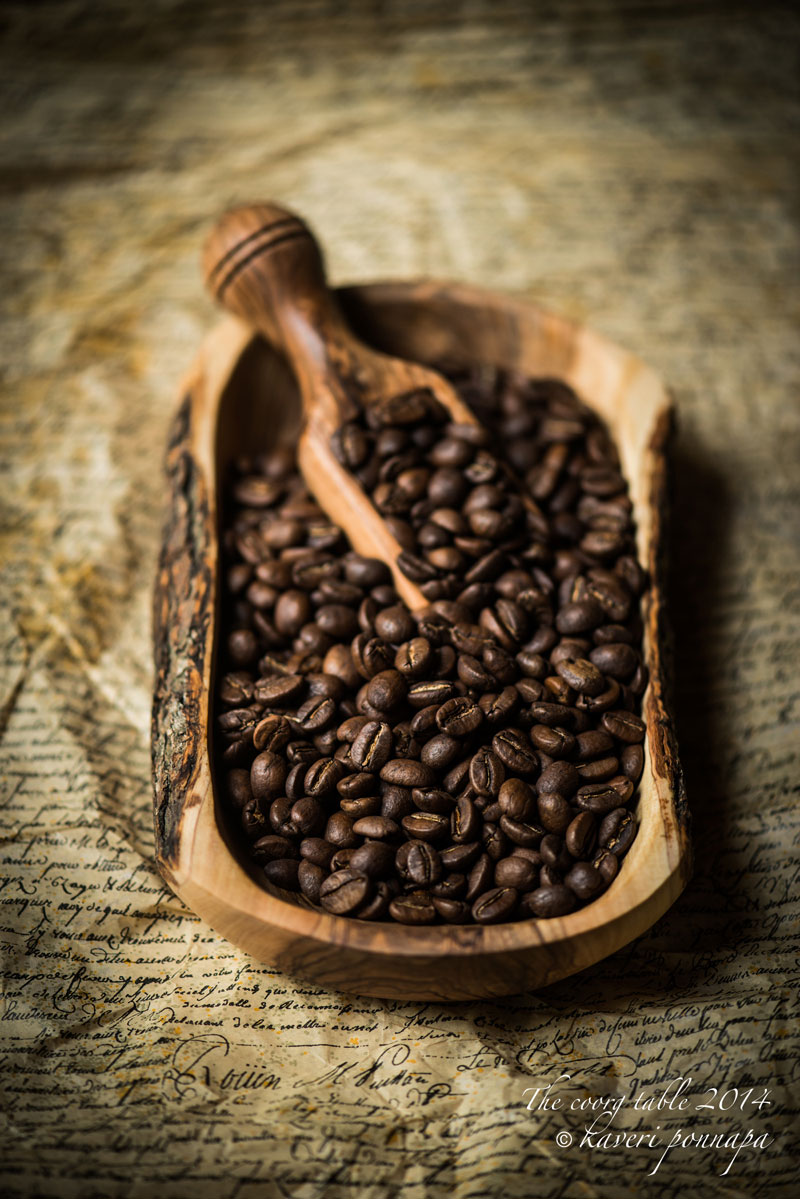 Coffee thrived in the Yemen hills, and shiploads were exported around the world, the trade controlled by the Arabs, who guarded their monopoly ferociously, scalding every bean that left the port of Mocha so that it would not germinate. But Mocha was home to the Sufis, and dervishes used the refreshing drink in their nightlong rituals; finally, it was a determined Sufi sage who broke the Arab monopoly –Baba Budan, who had travelled from Chickmagalur to Arabia on a pilgrimage, sailed out of the port of Mocha with seven coffee beans strapped around his middle and planted them in the hills named after him, where they flourished –all for a cup of coffee. The beans appear to have found their way to the wild little hill country of Coorg, because, by the time the British arrived with their commercial plantations, coffee was already growing there.
Coffee thrived in the Yemen hills, and shiploads were exported around the world, the trade controlled by the Arabs, who guarded their monopoly ferociously, scalding every bean that left the port of Mocha so that it would not germinate. But Mocha was home to the Sufis, and dervishes used the refreshing drink in their nightlong rituals; finally, it was a determined Sufi sage who broke the Arab monopoly –Baba Budan, who had travelled from Chickmagalur to Arabia on a pilgrimage, sailed out of the port of Mocha with seven coffee beans strapped around his middle and planted them in the hills named after him, where they flourished –all for a cup of coffee. The beans appear to have found their way to the wild little hill country of Coorg, because, by the time the British arrived with their commercial plantations, coffee was already growing there. 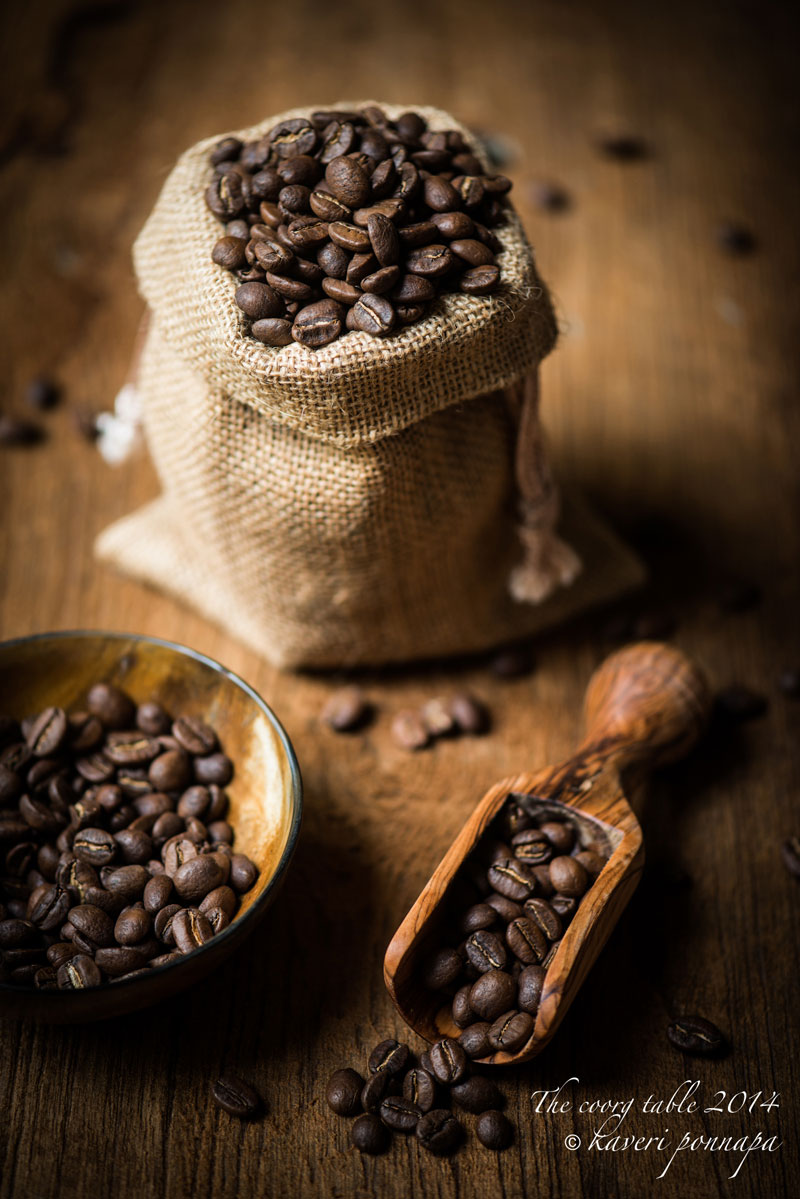 The coffee bean, which was originally covered with fat and chewed by nomadic tribesmen in Ethiopia, was transformed in Arabia into Qahwa, the dark, aromatic, refreshing brew served with a date, to welcome friends and guests. There’s not much to connect Coorg coffee with Qahwa, but a steaming hot cupful of bella kapi, boiled with jaggery to sweeten it, has been the way to welcome friends, visitors and travellers for generations, very much in keeping with the spirit of the original drink. The last kitchen ritual at night in many households was preparing the coffee to be drunk the next day. Scoops of dark brown, fragrant coffee powder were placed in a south Indian filter and boiling water poured in to allow it to steep overnight. The next morning, the liquor would be boiled with jaggery and strained through a muslin cloth to remove any grit, for a refreshing cupful. The aroma wafted right through the house, and it seemed like you could taste the coffee by just breathing it in. In the blustery, wet, monsoon months, or on cold winter mornings when a silvery haze still hung over the front yard after the sun had risen, a sip of this strong brew sent a wave of warmth rushing through you, defying the weather.
The coffee bean, which was originally covered with fat and chewed by nomadic tribesmen in Ethiopia, was transformed in Arabia into Qahwa, the dark, aromatic, refreshing brew served with a date, to welcome friends and guests. There’s not much to connect Coorg coffee with Qahwa, but a steaming hot cupful of bella kapi, boiled with jaggery to sweeten it, has been the way to welcome friends, visitors and travellers for generations, very much in keeping with the spirit of the original drink. The last kitchen ritual at night in many households was preparing the coffee to be drunk the next day. Scoops of dark brown, fragrant coffee powder were placed in a south Indian filter and boiling water poured in to allow it to steep overnight. The next morning, the liquor would be boiled with jaggery and strained through a muslin cloth to remove any grit, for a refreshing cupful. The aroma wafted right through the house, and it seemed like you could taste the coffee by just breathing it in. In the blustery, wet, monsoon months, or on cold winter mornings when a silvery haze still hung over the front yard after the sun had risen, a sip of this strong brew sent a wave of warmth rushing through you, defying the weather. 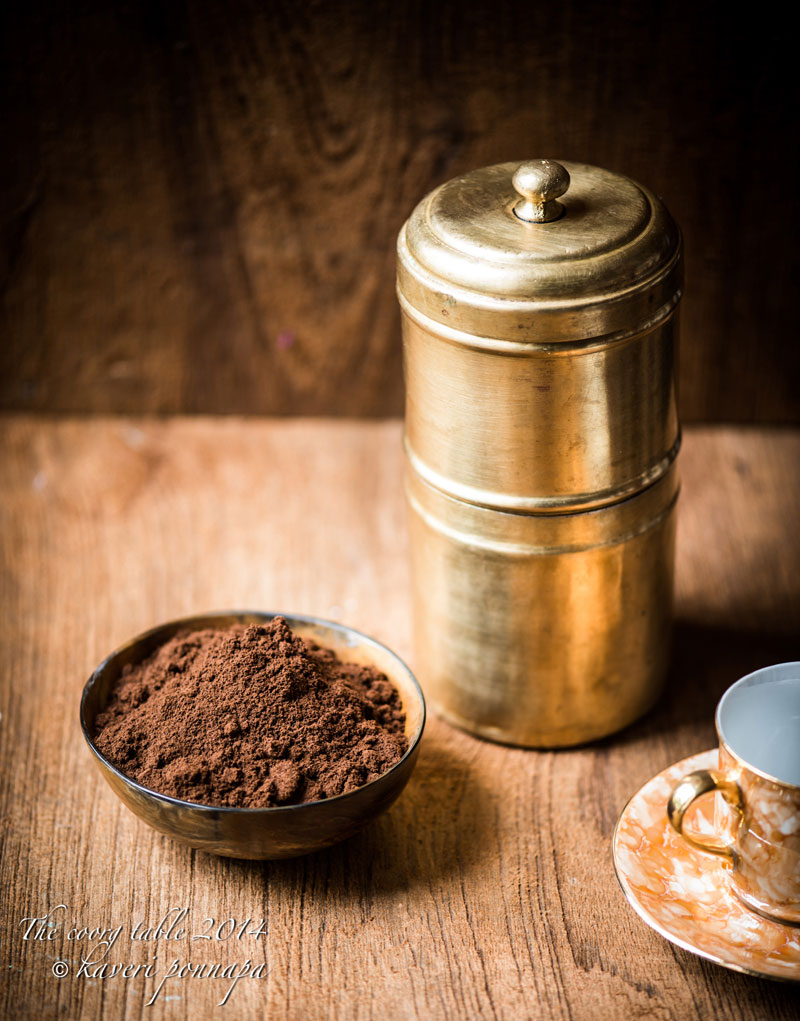 Coffee scents our lives in Coorg in different ways, every season. Surrounded by its dark green bushes, we take its long and adventurous journey to Coorg entirely for granted; but every year, we watch carefully for the early spikes that appear after showers of rain, which turn into sharp buds that suddenly burst into bloom, showering the air with their fragrance and white beauty. The firm, shiny green berries that follow turn a beautiful, bright red before scores of nimble fingered women descend to pluck them, and send them to be processed into a soggy, mulch smelling mush, so far away from the delicious aroma of dark roasted coffee. Piles of beans spread out in yards dry to a light brown, and slip like silk through your fingers; jute sacks filled with dried beans lurk in corners of houses, giving off an earthy, slightly sharp, familiar smell that lingers in rooms long after the sacks have made their way onto the market. The roasted beans are dark beauties, gleaming like polished wood, holding the promise of the rich, deep aroma that will come with grinding. Growing coffee has shaped life in the highlands of Coorg for so many generations, that you can recognize the seasons and measure out the year by the different scents that coffee leaves in the air. There is always a supply stored away for the household, and every now and then, some of it is sent to be roasted and ground, and returns in brown paper bags, leaving a powerful trail of scent everywhere.
Coffee scents our lives in Coorg in different ways, every season. Surrounded by its dark green bushes, we take its long and adventurous journey to Coorg entirely for granted; but every year, we watch carefully for the early spikes that appear after showers of rain, which turn into sharp buds that suddenly burst into bloom, showering the air with their fragrance and white beauty. The firm, shiny green berries that follow turn a beautiful, bright red before scores of nimble fingered women descend to pluck them, and send them to be processed into a soggy, mulch smelling mush, so far away from the delicious aroma of dark roasted coffee. Piles of beans spread out in yards dry to a light brown, and slip like silk through your fingers; jute sacks filled with dried beans lurk in corners of houses, giving off an earthy, slightly sharp, familiar smell that lingers in rooms long after the sacks have made their way onto the market. The roasted beans are dark beauties, gleaming like polished wood, holding the promise of the rich, deep aroma that will come with grinding. Growing coffee has shaped life in the highlands of Coorg for so many generations, that you can recognize the seasons and measure out the year by the different scents that coffee leaves in the air. There is always a supply stored away for the household, and every now and then, some of it is sent to be roasted and ground, and returns in brown paper bags, leaving a powerful trail of scent everywhere. 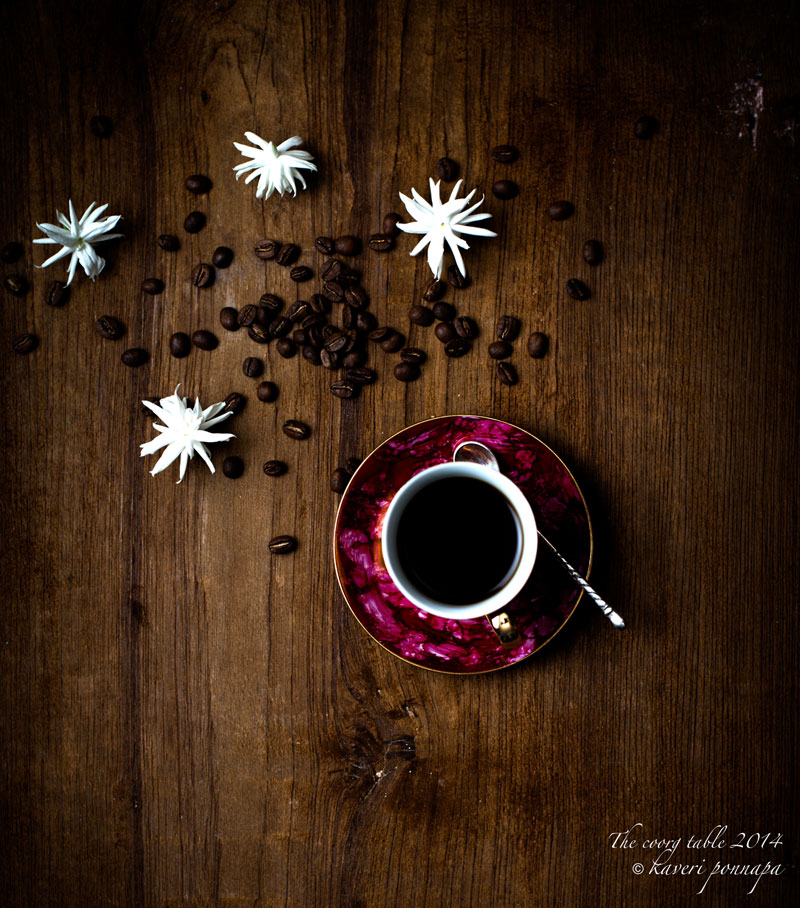 Over the centuries, a cup of coffee has been described in many ways –’black wine’, ‘devil’s brew’ ‘cup of gold,’ and the world drinks an astounding 400 billion cups a year. I have my favourites from the many exotic, subtly flavoured coffees from around the world, which are brewed on sophisticated machines; but a cup of traditional bella kapi evokes different emotions. In Coorg, where we grow some of the best coffee in the world, the scent of freshly made coffee is forever linked to a breakfast of akki ottis and elle pajji, or kumbala curry, followed by a deep sip from a cup of hot bella kapi, and also, the arrival of guests –it is rich, dark and sweet, holds memories of several seasons and the taste of the soil of Coorg in a single cup. As the Turkish saying goes, it is a taste as “dark as hell, strong as death and sweet as love.”
Over the centuries, a cup of coffee has been described in many ways –’black wine’, ‘devil’s brew’ ‘cup of gold,’ and the world drinks an astounding 400 billion cups a year. I have my favourites from the many exotic, subtly flavoured coffees from around the world, which are brewed on sophisticated machines; but a cup of traditional bella kapi evokes different emotions. In Coorg, where we grow some of the best coffee in the world, the scent of freshly made coffee is forever linked to a breakfast of akki ottis and elle pajji, or kumbala curry, followed by a deep sip from a cup of hot bella kapi, and also, the arrival of guests –it is rich, dark and sweet, holds memories of several seasons and the taste of the soil of Coorg in a single cup. As the Turkish saying goes, it is a taste as “dark as hell, strong as death and sweet as love.” 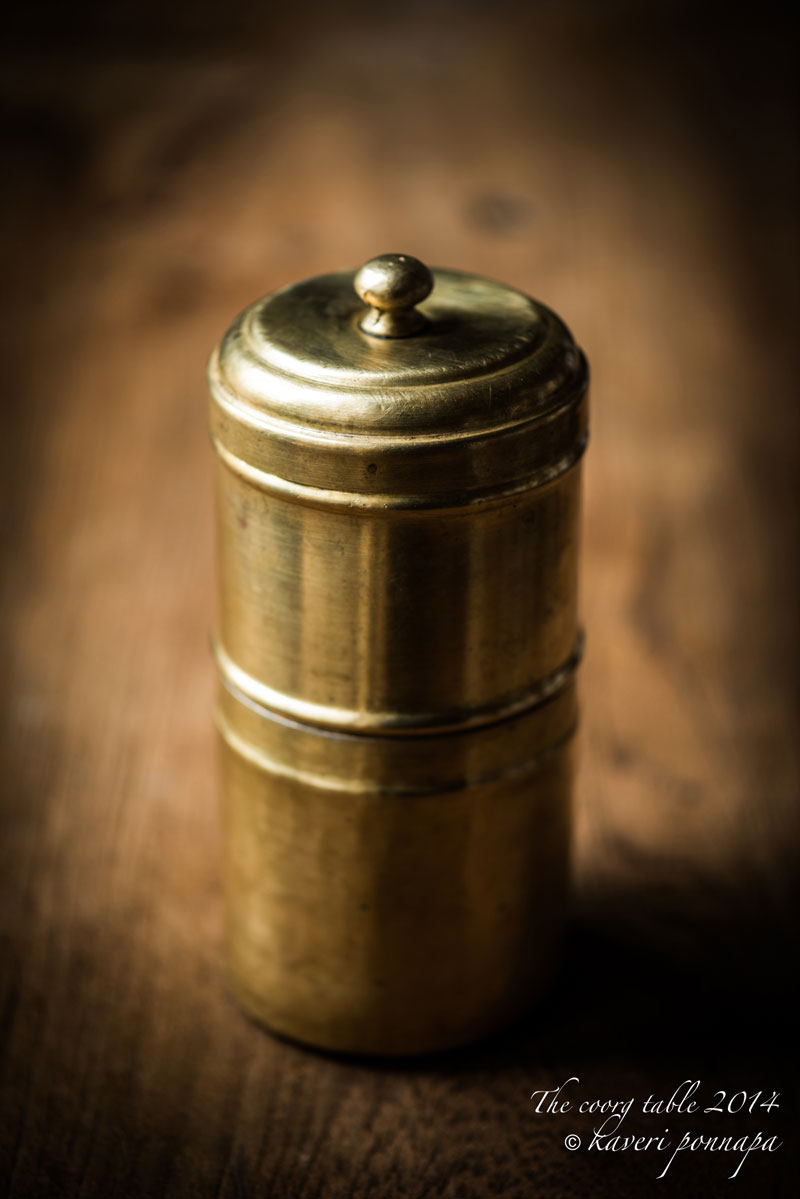
Image Credits: Nithin Sagi
All Food Styling: Kaveri Ponnapa
Bella Kaapi
(Traditional Coorg coffee, sweetened with jaggrey)
Ingredients:
- 4 cups water
- 4 level tablespoons fresh ground, dark roasted coffee powder
- Black jaggery, shaved into small pieces, to taste
Method:
- Put the water in a medium sized vessel and bring to a rolling boil.
- Add the jaggery, approximately 2 ½ tbsp. per cup, or to taste, to the boiling water. Allow it to dissolve completely, giving it a quick stir or two.
- Add the measured out coffee powder, and stir well.
- Allow it to boil for about 3-4 mins.
- Remove from the heat. Allow it to stand for a minute or two, for the sediment to settle.
- Take a small strainer, lined with muslin, and pour the essence through, taking care to avoid the sediment at the bottom of the vessel.
- Serve bella kaapi by itself, with bale muruku, or other savoury snacks and also, with a Coorg breakfast.
Another way to make this is by using a traditional south Indian coffee filter to make the coffee concentrate. The concentrate can then be diluted to taste with water, and boiled with jaggery in the same way.
Cook’s Note : The measurement for jaggery is approximate as the sweetness varies from one variety to another, as does individual taste. Sometimes, a small amount of powdered cardamom may be added for flavour.
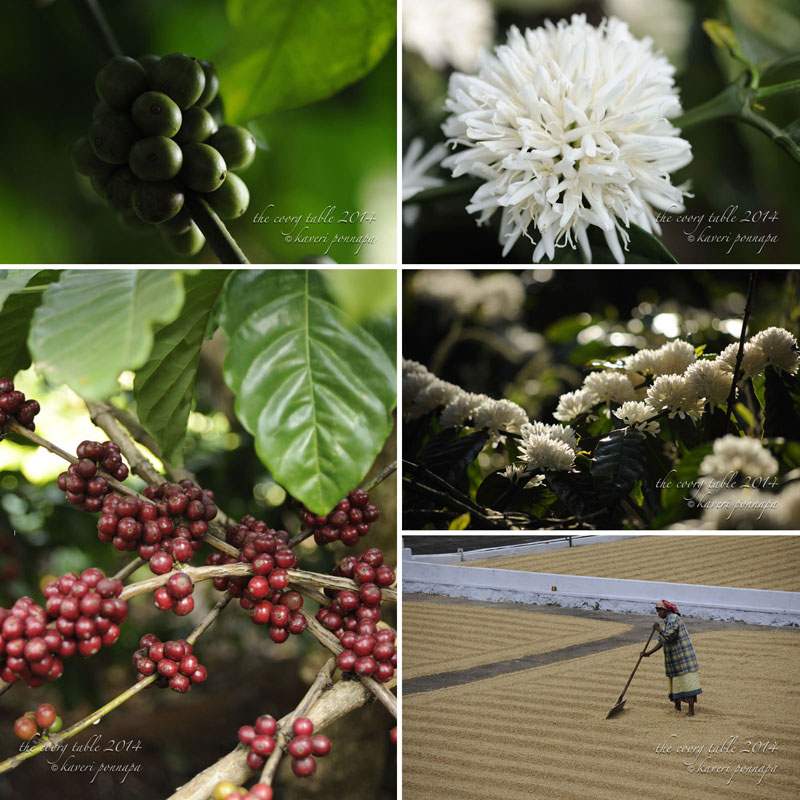
Image Credits: Sudeep Gurtu
Thank you for visiting this page. If you read something that you enjoy, or see an image that you like, please take a moment to write a response. Do look out for the recipes of all the food featured here in my upcoming cookbook.

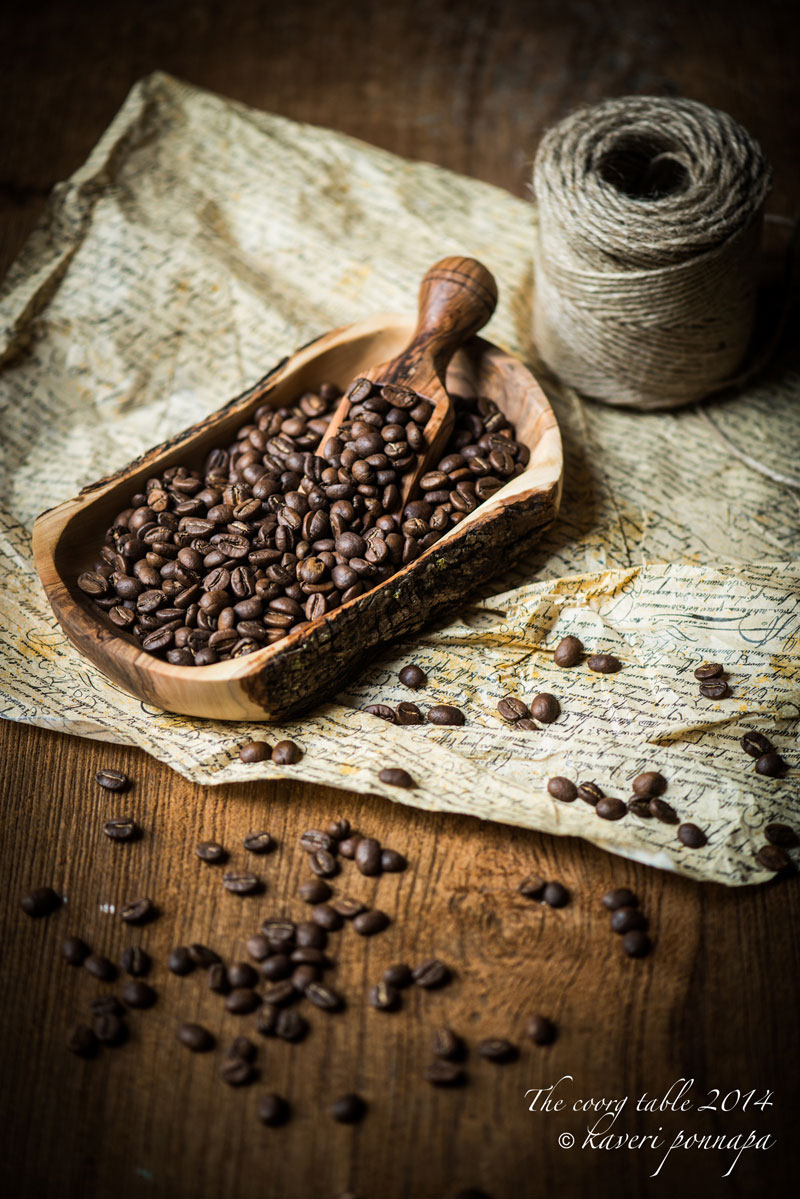
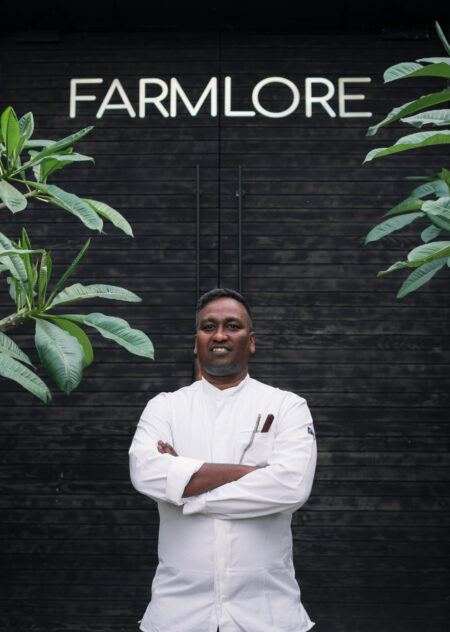
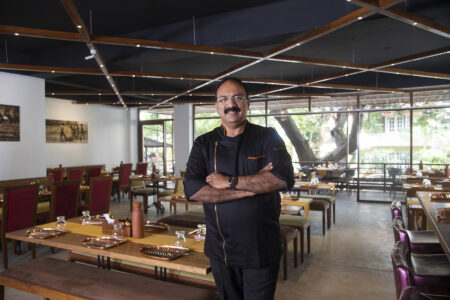

Very well written. The reader is transformed to the foot hills of Coorg and is experiencing the bella coffee!
I was searching for bella coffee recipe and pleasantly surprised to see your write up. Thanks for sharing!
Thank you for reading, I’m glad you enjoyed the post. I hope the bella kaapi turned out just right. Kaveri
Coffee brewing is an art by itself. Being an ardent coffee lover, I brew coffee with a Coffee Percolator. The one shot filtration helps retain the aroma and brings out the best in full from the coffee powder. Friends and relatives never say no to coffee at our home.
Oh Kaveri! What lovely memories this beautiful piece of yours has evoked for me! I remember so vividly the smell of roasted coffee beans being pounded by the maid servant in a big Pestle and Mortar, preparing fresh Coffee Powder ! I remember the clatter of Tea Cups and Saucers on a tray as she sailed into our bedroom every morning with hot cups of delicious, aromatic bed- coffee! We enjoyed this sweet awakening every morning for two whole months, when we spent our School Summer Vacations at Grandma Henderson’s home in Farview Estate, Kotagiri, Nilgiri Hills! Nothing like FRESH BREWED COFFEE! Thanks so much for sharing this little piece of heaven with us Kaveri!
Hello Bojamma, I hope the wait is not too long, and that when you return, there’s a steaming hot cup of bella kaapi waiting to welcome you! Coorg is very special, and when any of us leave, there’s so much that we miss. Thank you for writing in, and I do hope you enjoy all the other posts too. Warm wishes. Kaveri.
Thank you for writing this beautiful piece. It warms my heart and sinks me deep in nostalgia. I count days to be back in coorg and savor all those flavors that satisfy the soul. Your articles make the wait even harder 🙂
Hi Ajay, thank you for writing in. You certainly have a strong Coorg connection,with two sisters-in law from there.It would be great to hear about other Coorg food or drink that you like. Bella kapi is very refreshing,I hope you can make it regularly, from now on. Warm wishes.Kaveri.
I am some lovely memories of enjoying coorg coffee at friends. Somehow I haven’t been able to replicate the magic. I shall try again. You’ve explained it so wonderfully. My two sisters in law are also coorgs. Great going.
Bella coffee, Chakke kuru barthad in rainy season wow! Amazing!!….. Now it’s raining in Bangalore so we can have these combinations here, only one disappointment is we miss beauty of nature here…….. (here for Bella coffee you have used white jaggery but we use black one since white jaggery will be little salty)….Thanks for taking us to coorg all the time through you dishes……Thanks!!!
Hi Kaverappa, great to hear that you are enjoying the extended rains, and the mood food to go with the weather. These days, you get very good organic white jaggery, which is not salty at all, and works as good as black jaggery for bella kapi. I really appreciate your genuine interest in our cuisine, and always value your feedback. It’s great to connect with a real food lover! Warm wishes, Kaveri
Never knew this history behind “devil’s brew” that brings heaven…..with a early morning sip! Guess this is the only rare occasion when a devil takes you to heaven!…Appreciate the time and effort you invest in reading, researching and sharing with us. Tonight’s dream is reserved for the almond trees of Algarve!..Thank you..
Balaji
Hello Bajaji. Yes, that dark brew takes us straight to heaven, as you say! Many of us can hardly imagine a day that does not begin with the aroma of freshly brewed coffee, or, for that matter, the rest of the day sans coffee. If you haven’t experienced it yet, you should try to be in Coorg when the coffee blossoms are out – an enchanted time, the exquisitely scented air so different from the dark, rich aromas of roasted, ground coffee beans. Warm wishes, Kaveri
I am short of words to praise you for the way you have explained each and every minute detail in the most sweetest words.I could imagine each and every detail as I read through.Reminded me of my days in Coorg.Well done.
Thank you very much, Dhyan! It’s good to hear from you, and know that you related to the nuances of the post, and the way coffee influences our lives in Coorg. I hope you still manage to get your cup of bella kaapi, wherever you live now.Look forward to seeing you more often on these pages,. Warm wishes, Kaveri